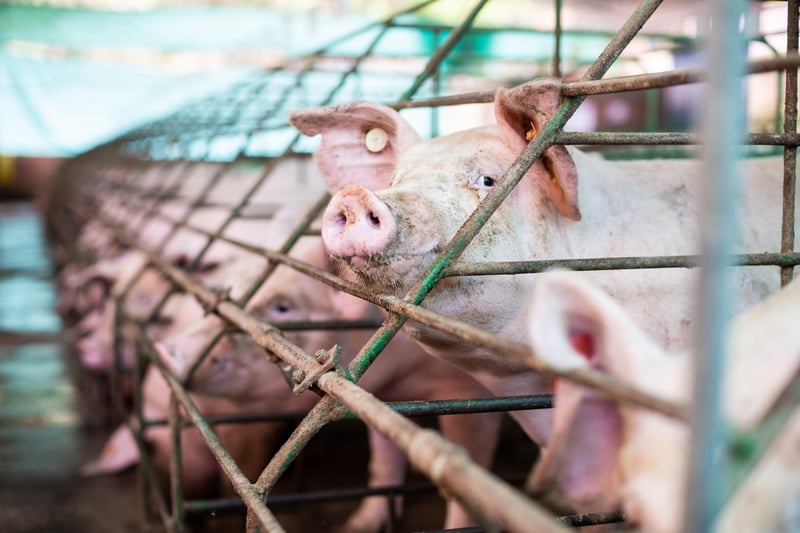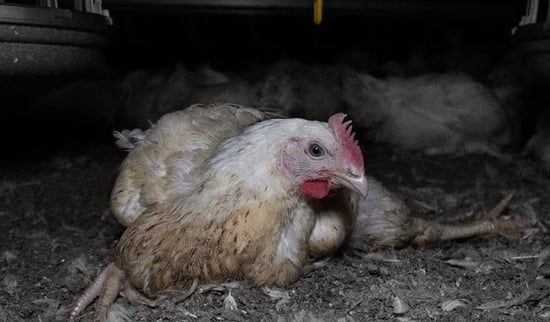
Just how essential is our “desired cut of meat”?
News
The COVID-19 pandemic has laid bare Australia’s bizarre relationship with meat. As restrictions began easing in Victoria, attention quickly turned to Christmas Hams, Turkeys, and family BBQs. People wanted to know if their favourite Christmas lunch would still be available this year.
By Rochelle Flood, Campaign Officer, World Animal Protection Australia
This fixation with meat supply was there at the start too, when supermarket shelves were stripped bare at the start of the pandemic. At the time, Premier Daniel Andrews appeared at a Press Conference to console those who “may not get their desired cut of meat.”
At a time when there were thousands of active cases, hundreds of deaths, and countless people out of work, you have to wonder why the cuts of meat available were seen as a priority? When we had toilet paper shortages, an end to panic buying was urged, but no politicians appeared on Prime Time TV to apologise for the fact that you had to choose Quilton instead of Kleenex. Why is that? Why is our relationship with meat so different to other food and basic household staples?
Let’s look at the numbers locally. Across Victoria, meat processing facilities were identified as a hotbed of infection. During July when infections were on the rise, meatworks were connected to more than 300 infections across Victoria. Despite these alarming numbers, staff at these facilities reported that they were too afraid to take time off, fearing dismissal if they did not continue to work.
Reports emerged that staff at meat processing plants were permitted to return to work before receiving their COVID test results – a liberty that would be inconceivable in most other industries. Many of these workers are in vulnerable positions without the benefit of full-time contracts.
Our unhealthy reliance on meat meant that politicians and corporations felt they could continue to put the lives of these vulnerable workers at risk. Workers were falling ill, transmitting the virus onto their families and further afield into aged care homes. But to ensure we could get our favourite cuts of meat, the workers would soldier on.
Our hunger for meat sees approximately 650 million chickens and 5 million pigs slaughtered each year in Australia. The sheer volume of animals going through the factory farming system means that the industry is incredibly vulnerable to disruptions.
A reduction in processing such as that caused by COVID-19, could result in serious over-crowding on farms, leading to significant animal welfare concerns. In extreme cases this could lead to on-farm culling to reduce stock levels. This would be a devastating outcome.
It’s clear that our meat consumption figures present a dangerous equation without an easy solution. On one hand, allowing workers to continue processing meat at normal rates presents a clear threat to their health, as well as the safety of the broader community. On the other hand, slowing or ending production would lead to animal suffering. Either way you look at it, our love affair with meat doesn’t have a happy ending.
While we were fortunate to avoid the staggering infections and loss of life connected to meat processing in America, which so far has led to more than 15,000 infections, over 86 worker deaths, and the culling of more than 10 million farm animals, we cannot overlook the consequences of our own relationship with meat.
Instead of turning our focus to ramping up production of Christmas hams, and turkeys, we should look to more sustainable models. We need to challenge the notion that meat is essential to how we live. Christmas will still be Christmas without a leg of ham.
Excessive meat consumption results in animal welfare issues, health issues, and climate destruction. This pandemic has given us yet another reason to drastically reduce demand for meat so that the next time we are faced with a pandemic or similar widespread disruption, we won’t face the same dangerous equation.
Factory farming
Factory farming does not just inflict unimaginable suffering on billions of animals, but the intensive and cruel methods also lead to the destruction of habitats and release climate-changing greenhouse gas emissions into the atmosphere.
Join the Plant Protein Challenge
You can commit to swapping meat for plant-based protein for just three days a week over 8 weeks. And we’ll be supporting you every step of the way.

